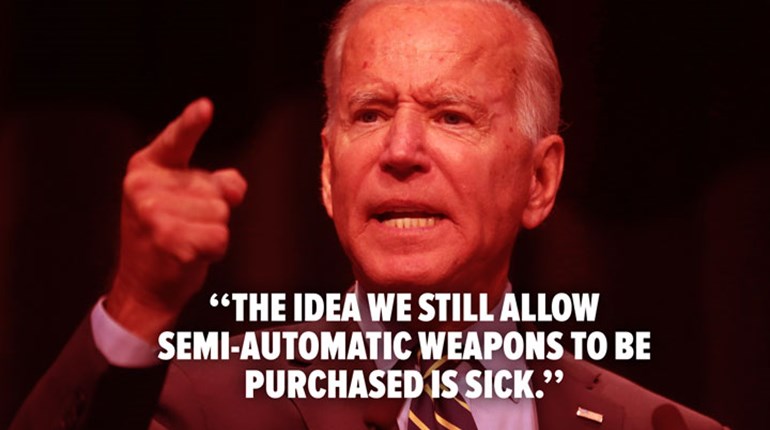
“If we can’t do it legally, let’s just find another way.”
That seems to be the motto that gun grabbers choose to live by. After years of having their efforts to ban firearms legislatively thwarted, they have moved to another arena, where financial pressure is the top strategy in the playbook.
First, we’ve seen in by upstart chief executive officers—like Edward Stack of Dick’s Clothing and Sporting Goods—want only make business decisions based on nothing but their own beliefs. Now, we’re seeing the gun control crowd go further, working diligently to hit gun companies in the wallet on the financial markets.
“What if the credit card industry made it more difficult for people to purchase assault rifles, high-capacity magazines, and bump stocks… At Trillium, we thought the idea had so much merit that we are pressing banking and credit card companies to take action.”With $2.5 billion in assets, Trillium Asset Management provides investment management services for financial advisors, foundations, endowments, nonprofits, and others.
Many Americans aren’t self-directed when it comes to making investment decisions. Indeed, whether it be through pension plans or long-term savings options through the workplace, most individual investors seem content to put their monthly savings into such tools as mutual funds, trusting the team at the brokerage to make choices about how much to invest in technology companies, utilities, producers of consumer staples or firearm manufacturers—though if the anti-gunners have their way, that last option will soon be crossed off the list.
A few years back, a financial advisor told me that her fiduciary responsibility extended to such things as listening to me if I were to say, “I don’t want to support big tobacco.” If such were the case, she would be obligated to see to it that not a dime of mine went into cigarette company stocks. I could see the logic in that. If someone vehemently opposes something, that individual has a right to avoid supporting the business.
But it’s frightening how much money is under the control of investment firms or pension plans that won’t touch firearm manufacturers with a 10-foot pole. In 2016, an estimated $845 billionin assets was tied up in companies that preach “gun-free” investment strategies.
Now, as an individual investor, what you or I choose to do with our money is one thing, but when the big financial houses cast aside fiduciary responsibility in favor of political preferences? Well, that’s darn right irresponsible. And the forecast is that such environmental, social and governance (ESG)-factored investing—some call it sustainable investing—is on an upward trend line.
The attack is two-fold: first is the threat of disinvestment; second is the more subtle approach of throwing their financial weight around to force companies to change the way they do business.
Among these targets are pension funds and large corporate investment portfolios. A Bloomberg article on Nov. 18 blazed: “Investors With $4.8 Trillion Push Gun Industry for Reform”.
That article quoted a gun-control advocate in a coalition who is also a chief investment officer of a large state pension fund. The investment officer reportedly “contacted the top shareholders of gun makers, most of whom haven’t joined the coalition. The group is reaching out to other institutional investors and companies involved in all aspects of the firearms industry including sales, manufacturing, distribution and financing.”
It noted that for the first time this group of 13 heavyweight investors formed a coalition to pressure the firearms industry. The members were identified as:
- California public employees,
- California teachers,
- Connecticut pension fund,
- Florida pension fund,
- Maine pension fund,
- Maryland pension fund,
- Oblate International Pastoral Investment Trust
- Oregon pension fund,
- Rockefeller Asset Management,
- San Francisco pension fund,
- State Street Global Advisors,
- TIAA’s investment manager Nuveen, and
- Wespath Investment Management.
The premise—supported by such anti-gun behemoths as Michael Bloomberg, the chief architect of Everytown for Gun Safety—is simple. Money talks, and if the institutional investors can exert enough pressure on the firearm industry, soon they’ll be able to push through all their brilliant gun control ideas, like demanding that all guns be “smart guns,” even if the technology doesn’t support such an idea. And what’s worse, is that in many of the cases, the individual investor has no say in the matter because the institutional investors are managing billions or trillions for such things as pension plans.
The scary thing is, it used to be predictable. If shareholders voiced concerns, they could influence corporate decisions. No such thing exists these days, where arrogant CEO’s like Stack discount any opinion that differs from their own.
You’ve read about it here before, how business leaders are so adamant about gun control that they don’t care a whit about what shareholders have to say or about whether their so-called business decisions send the company on a downward spiral. And why should they? They’ve made their millions, so if sales slump it’s no great loss for them. Even if they lose their jobs, they’ll likely get a golden parachute exit package that will ensure a soft landing.
Of course, when it comes to the anti-gunners’ opinions, you can bet the CEOs will lend a more sympathetic ear. Then they’ll cast responsibility for the decision on the shoulders of the investors—“But they voted at the last annual meeting, and this is what they wanted,” the business leaders will contend.
So what does that say about our free-market economy and the freedom of choice?
Once upon a time, investment firms made decisions based on an index, diversification, earnings potential, price/earnings ratios, revenue growth and so on.
Now, not so much; and the individual investor has ceded control (in the case of 401(k) investments) to the faceless institutions that pull the strings that affect the rest of their lives., or (in the case of pension funds) are at the mercy of the same financial companies.
They’ve got ordinary Americans over a barrel because the one thing most of us grow up hearing is that you have to plan for your future, and a big part of that is dependent on financial security.
But then no one teaches children how to reach a candlestick chart and how to critically assess moving average convergence-divergence trends, etc. If I’ve just lost you with that last sentence, you know exactly what I mean.
Many workaday Americans simply don’t have the expertise to manage their investments for the prospect of long-term security.
The only hope would be to exert a counterattack through regulators, moving to once again hold investment houses to a strict fiduciary responsibility code.
But if the gun grabbers have their way that will never happen because so many Americans are apathetic when it comes to fighting for something they don’t understand. They’re more content to sit back and blindly trust the “professionals.”
One option might be for the firearm manufacturers and ancillary industries to band together and devise an easy way for everyday Americans to invest. Kind of like the days of yore, when private investments or venture capital helped start-ups. Until that happens, investors have to go on offense instead of sitting on the sidelines letting those with deep pockets control things.
When it comes to investing outside of a company-run 401(k) or pension fund, find a financial advisor who will listen to your concerns.
Don’t take the easy way out and put all your money into mutual funds or exchange-traded funds (ETFs); go for straight equity investments where you can support individual companies instead of blindly throwing money into a group of businesses that you can’t even name.
If you must go the way of mutual funds, get the list of companies that a fund includes.


































